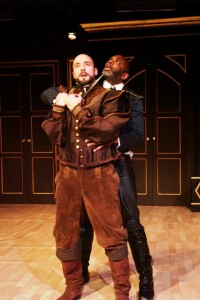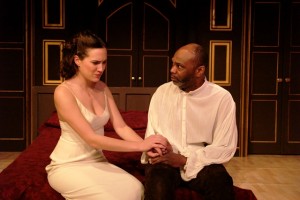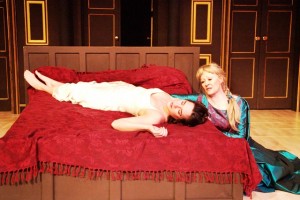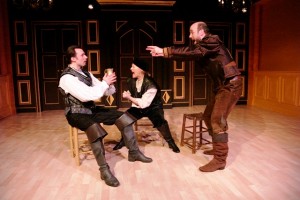by Uta Buhr
Photos: Hans-Jürgen Kock

“Oh, bother that classical stuff!” At school, aged between 15 and 16, we preferred modern plays and despised “old stuff.” With one exception. Guess which play it was. Right – Othello! That play written by “the swan of Stratford” thrilled us youngsters, since everybody even at that young age already had their own experience of jealousy and rivalry. It goes without saying that no one among us even spent a thought on scheming like Iago, let alone killing an opponent. So far my own thoughts way back into my days as a teenage girl.
It was a wonderful idea to stage this great drama at the English Theatre which is known in town for the great variety of English and American plays. Six actors are on stage, two of them in three different roles. The stage set is elegant and simple, while the costumes reflect the fashion of the early 17th century. Perfect.
Part I of the play takes us to the house of Iago in Venice, where he complains to his friend Rodrigo, a rich Venetian gentleman, that Senator Brabantio refused him his daughter’s hand in marriage. Instead Desdemona, the Senator’s child, is in love with Othello, a Moorish general in the Venetian army. Desdemona has married Othello in secret. At first Brabantio was by no means amused when he learned of the marital relationship between Desdemona and Othello. But he is content when he hears that his daughter is truly in love with her husband. However, he warns that Desdemona will betray Othello: “Look to her, Moor, if thou hast eyes to see. She has deceived her father, and may thee.”

Part III starts with heavy storms over Cyprus and the defeat of the Turkish fleet. Othello has come to the island in the Eastern Mediterranean to celebrate this military success and to celebrate his wedding to Desdemona. Along with him comes Cassio, his lieutenant who, in Rodrigo’s mind, “stole” the job from him. Iago who is a most ambitious and cunning character, starts to hate Othello and plans to take revenge on him. And what is better suited for an act of revenge than an artful intrigue against the wife of an opponent. And here we go. Iago plants suspicion into Othello’s mind, making hints to Desdemona’s infidelity. Is she not in love with Cassio?
When Othello, driven by jealousy, dismisses Cassio, Iago and Rodrigo go even further in their efforts to estrange Desdemona and Othello. There is just one thing missing – the proof of Desdemona’s disloyalty to her husband. When Desdemona loses a precious handkerchief, a present given to her by Othello, her loyal attendant Emilia, Iago’s wife, picks it up and hands it over to her spouse in all innocence. She has not the slightest idea of what Iago plans to do with his “prey.”
In part III Iago plants the handkerchief in Cassio’s lodgings. He gives the good advice to Othello to watch Cassio’s

reaction who – as Iago insinuates – is Desdemona’s lover. Othello is deeply hurt and plans to kill his wife by poisoning her. But Iago tells him that it would be much more effective to strangle her. He gives order to Iago to kill Cassio. Iago passes the order on to Rodrigo who attacks Cassio in the street and wounds him. When the conspiracy is revealed, Iago himself stabs Rodrigo who dies on the spot.
Othello driven by hurt pride and jealousy confronts Desdemona in her bedroom and strangles her to death. Emilia realises what her husband has done and confesses his intrigue to Othello who now becomes aware that he has murdered an innocent human being – his own wife. The bloodshed goes on when Iago kills his wife Emilia for her betrayal. Othello on his part stabs Iago, however not fatally. While Othello commits suicide by killing himself with a dagger, Iago is imprisoned by Cassio who is given the power to punish him justly.
Wow – what a play! Shakespeare’s Othello is based on one of altogether one-hundred novels – “Degli Hecatommithi” – written by the Italian poet and philosopher Giraldi Cinzio who was born in Ferrara. Cinzio’s “Moor” – a black-skinned man from North Africa – served as the model for the Shakespearian Othello. And what about William Shakespeare? Did he write his dramas and comedies himself, or served he a nobleman named Edward de Vere, 19th Earl of Oxford, as “camouflage”, since in the olden times is was by no means suitable for a man of noble birth to write plays for the theatre, let a lone for the great public that Shakespeare’s plays used to attract. No matter who wrote all these extraordinary plays, comedies, poetry and sonnets – they will last forever – they are simply immortal!
Thanks to William Shakespeare and thanks to six gifted actors, the play enchanted the audience from the first to the last minute – altogether 180 at that!

Declan Wilson, whom we already know from “The Whipping Man” (at the TET in 2014) was just great in the part of Othello. The same refers to Imogen Daines, a frail and loving Desdemona whose chagrin was nearly palpable. Congratulations to Neal Craig who gave Iago , the weird cunning character so authentically that his play could make your blood freeze. Three “multitaskers” – Zena Carswell, Jilly Bond and Joseph Cappellazzi – had to play several roles – two of them even three. Thank you all for this wonderful performance and come again!
Last performance of “Othello” on April 15, 2017
Tickets under the telephone number 040 – 227 70 89 or online under
Next premiere “April in Paris” by John Godber on April 27, 2017
